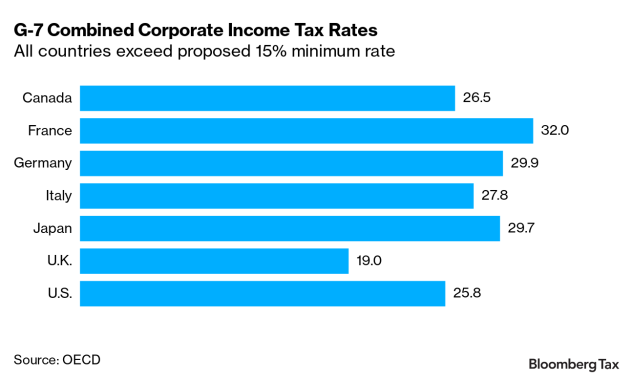For weeks, the tax world has been buzzing about the G-7 Summit and what it could mean for multinational corporations.
G-7 is shorthand for the Group of Seven nations, a consortium of wealthy developed countries that have met regularly since the 1970s to discuss global economic concerns and initiatives. Today, the G-7 includes Canada, France, Germany, Italy, Japan, the U.K., and the U.S.
U.K. Prime Minister, Boris Johnson, hosts leaders from the USA, Japan, Germany, France, Italy and Canada at the G-7 Summit.
Photo by Jonny Weeks – WPA Pool via Getty Images.
This month, the leaders of those countries met in Cornwall, England, for the G-7 Summit. Those in attendance included host Boris Johnson (U.K.), Justin Trudeau (Canada), Emmanuel Macron (France), Angela Merkel (Germany), Mario Draghi (Italy), Yoshihide Suga (Japan), and Joe Biden (U.S.). Charles Michel and Ursula von der Leyen were also present representing the European Union; the EU is not a member of the G-7 but typically attends the summit.
During the summit, those leaders attended meetings and published joint statements on issues affecting world economies and other policies like climate change. And, not surprisingly, a global tax deal was center stage with considerable interest focused on multinational corporate tax, transfer pricing, and digital taxes. You can find out more in What You Need to Know About the G-7 Tax Agreement.
It’s a lot for tax practitioners to keep up with, which is why we have you covered with our Insights Roundup.
Quick Numbers Trivia
The G-7 has agreed in principle to a minimum global corporate tax rate of at least 15% on multinational corporations. How many of the G-7 countries currently have a corporate tax rate higher than 15%?
(Answer at the bottom.)
Our Roundup
It’s essential to keep up with global tax moves impacting tax planning, compliance, and enforcement. From minimum tax rates to transfer pricing, here’s what our tax professionals are talking about this week.
The finance ministers of the G-7 have announced their support for a global minimum tax of at least 15% and for the reallocation of certain profits for large multinationals. In The G-7 Finance Ministers’ Announcement on Pillars One and Two: Does It Matter?, Jeff VanderWolk of Squire Patton Boggs considers the implications.
For more on the G-7 tax agreement, check out this week’s episode of Talking Tax, G-7 Tax Agreement Was Big, But Now Comes the Hard Part.

France’s President Emmanuel Macron (L) shakes hands with President Joe Biden before a bilateral meeting during the G-7 summit in Carbis Bay, Cornwall in the U.K. on June 12, 2021.
Photo by Ludovic Marin/AFP via Getty Images.
This spring, the U.S. government proposed scrapping the OECD requirement that only automated digital services and consumer-facing businesses would be included in Pillar One, the OECD’s proposal for taxing the digital economy. In Part 1 of a two-part article, Taxing The Top 100, Lorraine Eden of Texas A&M University illustrates how the U.S. proposal would create an incentive to regularly restructure multinational enterprises to fall outside of the Top 100. In Part 2, Eden shows that the U.S. proposal to use the Top 100 multinationals enterprises could be impractical to administer because of the regularly changing membership.
The rise of tax technology owes much to the development and implementation of AI technology. The digitalization of economic transactions on cloud platforms brought changes to our workplace and daily lives. The digital economy also brought an unprecedented amount of information previously unavailable to everyone. In Technology for Transfer Pricing, Shan Sun of Unilever PLC, examines the challenges and opportunities these changes bring.
Digital assets bring new tax challenges to international tax systems. In Tax Challenges of the New Digital Assets—and their Treatment in Portugal, Rogério M. Fernandes Ferreira of RFF & Associados explains how unique, identifiable digital assets such as non-fungible tokens raise questions and discusses their current treatment in the Portuguese tax framework.
Closer to home, domestic businesses are still struggling to recover from the pandemic. Challenges are relief programs continue to make news.
The pandemic made remote work necessary for many businesses where it may have been only an occasional practice. Many employees decided they liked it. Many businesses began contemplating reducing their office space expenses. In What’s Your Plan? Avoiding Tax Pitfalls of a Remote Workforce, Jennifer Weidler Karpchuk and Katherine Noll of Chamberlain Hrdlicka walk through the tax considerations and how to plan for an expanded or more permanent remote workforce.
The Restaurant Revitalization Fund provides relief to restaurants and other eligible businesses with gross receipts from sales of food and beverages. In Key Takeaways of the Restaurant Revitalization Fund, Sofia Cordero of Mazars explains how the program works and the requirements to participate.
The IRS has issued formal guidance on employee retention credits (ERCs). In IRS Issues Notices With Updated, Formal Guidance on Employee Retention Credits, Isabelle Farrar, Alec Oveis, and Joshua Thomas of Ropes & Gray LLP explain how the credit works, and how businesses can take advantage simultaneously of both Paycheck Protection Program (PPP) loans and the ERC.
PPP loans raised many questions for businesses and tax professionals. You can hear more about the launch of the program, its future, and efforts to stop pandemic relief fraud in a recent episode of Talking Tax.
Write for Us
Bloomberg Tax Insights articles are written by tax professionals offering expert analysis on current issues in tax practice and policy, tax trends and topics, and tax and accounting firm practice and management. If you have an interesting, never-published article for publication, we’d love to hear about it. You can contact our Insights team by emailing [email protected].
Spotlight
This week’s spotlight is on tax professor Leandra Lederman. Lederman is the William W. Oliver Professor of Tax Law and Director of the Tax Program at Indiana University Maurer School of Law. As a tax professor, she runs the Indiana/Leeds Summer Tax Workshop Series with Prof. Leopoldo Parada from the University of Leeds. She has also co-authored books on tax controversies and corporate taxation, published over 50 articles, and is one of the 10 most frequently cited U.S. tax scholars.
Student Writing Competition
Think you have the “write” stuff for Bloomberg Tax Insights? We’re excited about our inaugural Bloomberg Tax Insights writing competition, intended to highlight the very best of student writing. Due to a flurry of recent submissions, our deadline has been extended to June 30, 2021.
Run with Us
Ready to blow off some steam after a long (long) tax season? It’s not too late to sign up for our virtual 5k. Run as fast as you want—or take a walk just to enjoy the fresh air—and earn a cool medal. And since #TaxTwitter loves its waffles, pancakes, and other breakfast foods, we’re paying it forward by donating the proceeds to World Central Kitchen to fight hunger. You can sign up here.
Quick Numbers Answer
All seven.
Exclusive Content for Bloomberg Tax Subscribers
As the digital economy is becoming the global economy, historically non-digital companies are developing innovations and creating new commercial offerings never before seen. In this special report from Baker McKenzie’s global tax practice, you’ll find an overview of digital technology trends that all non-digital businesses are incorporating, which interact with the key tax trends companies must actively navigate. You’ll also find case studies focusing on Healthcare, Consumer Goods & Retail, and the broad Industrials and Manufacturing sector, together with an overview of digital-specific international tax and transfer pricing development trends.
*Note: Your Bloomberg Tax login will be required to read the special report.
More Great Tax Content
This is a weekend roundup of Bloomberg Tax Insights, written by practitioners and featuring expert analysis on current issues in tax practice and policy. For a full archive of articles, browse by jurisdiction at Daily Tax Report, Daily Tax Report: State, Daily Tax Report: International, Transfer Pricing Report, and Financial Accounting.
You can also follow Bloomberg Tax on Twitter, Facebook, and LinkedIn.
What Did You Think?
We hope you found Weekend Insights valuable. We’d love to hear your suggestions for making it more enjoyable. Here’s our email: [email protected]. Thank you for reading!
